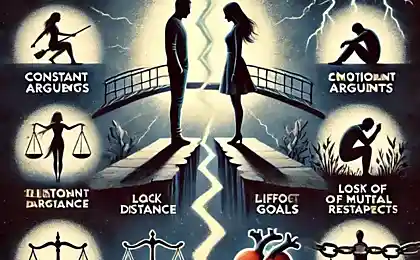406
Aftertaste of the relationship - what remains in our soul
Aftertaste of a relationship – what’s left to live in our souls for the rest of our lives? How do conclusions made about our previous relationships affect our perception of future relationships and our future behavior?
In psychology, there is the concept of unfinished situations. The peculiarity of the psyche is such that we cannot forget and let go of the situation / person until all emotions in relation to her / to him are lived. Only then will the situation/relationship end for us and there will be ease.

Photo from the movie 'break up'
This truth is scientifically confirmed by the famous “Zeygarnik effect”, the discovery of which was facilitated in the 1930s by a funny experiment.
Psychological experiment in a restaurant
It was recorded that the waiters remembered in detail the dishes and drinks that were ordered by customers who had not yet paid the bill, even if the order had been made a few hours earlier (unfinished situation). Dishes and drinks of those customers who have already paid the bill, even if it happened 5 minutes ago, waiters remembered with great difficulty, or even could not remember (completed situation).
The Zeigarnik effect states that unfinished actions are remembered, on average, one and a half times better than completed ones. An unfinished situation is one and a half times more difficult to forget!
Memories that cause discomfort
As for relationships between people, adequate termination of these relationships often does not occur, which leads to chronic emotional stress of low intensity in the participants of these relationships (“can not forget”). This tension takes us months and years. Such incompleteness is experienced as mild sadness, awkwardness, annoyance when remembering a person / situation and up to a depressed state.
The End of Relationship Stage
The fourth and final stage in the development of any relationship is the stage of “completion and goodbye.” Inadequate passage of this phase aggravates the emotional state of a person and prevents them from living a new life, building new relationships. Adequately ending a relationship takes time and effort, but the joy and ease that comes with it is worth it.
After Phase 4, the relationship may end completely, or may move back to the first phase ("trust-building"), but at a new level. The 4 “Completion Stages” refers to both a complete goodbye and the completion of a phase of life, such as:
When a man and woman complete the phase of meetings, the phase of life separately before the beginning of life together.
End of service in one position before moving to another position at the same place of work, etc.
A good ending to a relationship – how is it?
The main task of the 4th stage of “completion of relations” is a qualitative summing up of results. How you let them down will determine how that experience will live on in your soul, perhaps for the rest of your life. The conclusions we draw about our life experience VERY affect our further behavior and perception of reality in general.
A few examples from life.
1. "Rapid conclusions"
The woman broke up with her husband (he cheated on her). The conclusion she made is that men cannot be trusted. In her subsequent relationships, she tortured her man with intrusive questions such as “where have you been?”, baseless jealousy. The relationship went to the limit and they broke up. Thus, the conclusions made about the previous experience influenced the new experience, provoking a tragic outcome.
This was due to the fact that the relationship with the ex-husband remained unfinished / was completed superficially. In this case, a good conclusion could be the awareness of all that in the relationship between the woman and her husband, which led to treason. Studies show that infidelity (husband) occurs as a result of physical or emotional rejection (wife) or hidden undiscussed and unresolved conflict between them.
It is not easy for a wife to return to difficult experiences, it is even more unpleasant to take her share of the responsibility for cooling down / tension in her relationship with her husband. Of course, the betrayal itself is his responsibility, but unresolved conflicts, tension and cooling of relations with his husband are their common cause. A good ending for a woman is taking her share of responsibility for breaking up the relationship: for what she did (for example, ignored her husband) or did not do (for example, did not listen to him), as well as giving her husband his share of what was done and not done. This can be unpleasant, but it is useful to do so:
1. See the reality (of both sides).
2. Take back power. He sees himself as a victim and a tormentor.
Such a deeper review of the relationship will lead to a new interpretation of what happened. And “men can’t be trusted” can change to something else, such as a more detailed understanding of what behavior leads to the destruction of relationships and what leads to strengthening. So, the work on the completion of the situation can turn into a valuable and useful experience in the future.
2. " I was abandoned.
It happens that one of the participants in the relationship decided to end the relationship - quit, fire, abandon the other. For the abandoned, this situation is very traumatic, as he is left without discussion, and sometimes without a clear explanation of the reasons for what is happening, and he remains in the dark, with a sense of incompleteness, severed relations.
A wife leaves her husband for another man. (Husband does not earn enough by her standards, and she is constantly humiliated by living on a modest income.) For her, their relationship is over and she doesn't want to communicate. For him, her departure is a surprise. He's trying to talk to her, figure it out, maybe get her back. The most painful experiences are helplessness, humiliation, despair. The main reason for the suffering is that he feels like a victim, because for himself he did not make the decision to part with her.
This inconsistency is most often due to the fact that one of the partners (in this case, the husband) ignores the long and sluggish alienation between them, and also ignores the cause of this alienation. He is full of illusions about their relationship (he thinks they are normal). And for quite a long time closes his eyes to reality - coldness and dissatisfaction of his wife.
A good conclusion for him may be to destroy the illusion of unity with his wife and face the reality that the wife is a person who is very different from him in goals and values (and does he accept her as so different?). And also, the meeting with the fact that she does not accept him as he is at the moment, rejected.
Realizing such a reality, he will feel his decision, WANT and CAN he meet its conditions, whether he is ready to redraw himself (for example, to put money making at the forefront of his life), or such a redrawing is not acceptable for him. Since he has stubbornly ignored his wife’s wishes all this time, it is clear that he WANTS to live differently. Experiencing the difference between them will help him realize his rejection/rejection of his wife’s values and end the relationship at will.
Farewell traditions
For many, ending is not a phase of a relationship, but a brief moment.
There are many traditions of farewell:
- a bolt on the move.
funerals and funerals in case of death.
Farewell lunches, walks and conversations when parting friends or lovers.
All these traditions are designed to help a person emotionally experience goodbye and experience lightness and enlightenment as a result.
3. "Avoiding Goodbye"
As a rule, people avoid saying goodbye, explaining, expressing disappointment and gratitude. And not only in the relationship (completely not saying goodbye to a person), but also in themselves - try not to think about it - "out of sight - out of the heart." The result is not the end of the relationship, but a break.
I want to note that the “place of rupture” in the psyche is a bleeding wound that requires a kind of suturing (or otherwise a scar for life).
5 years ago, a girl (my client is a member of the therapeutic group “Relations from A to Z”) abruptly and without much explanation broke off her relationship with a young man. He got addicted to drugs, she stopped trusting him. She experienced the collapse of hopes for happiness with him, a lot of powerlessness, anger and disappointment in him.
Life after the breakup with him generally went well. Over time, she built a new happy relationship. However, she began to torment dreams about the man (waking up in tears), in the subway she thought that she saw his silhouette from afar, she often caught herself thinking about him. In the group, one of the participants strongly reminded her of that man (she and elsewhere often met someone similar to him). She sympathized and disliked this similar participant. Sincere conversations between them in the group helped the girl to complete the picture, live out unfinished feelings for the former young man and heal the wound.
It happens that inside of us we want to say goodbye to a person. For example, we want to stop communicating often and openly, we want to distance ourselves to the distance of a friend. However, evading the explanation, we begin to completely avoid the person who was once close. Tormented by a sense of guilt, understatement, desperately in need of goodbye and forgiveness, we pull the “suitcase without a handle” – it is difficult to carry, and it is pathetic to abandon.
Why are we so reluctant to end a relationship?
Because completion is often associated with difficult emotions:
- Weeping and saying goodbye to what or who was valuable.
- Something that could have happened but never happened.
- What happened was important, but it was over.
- Living and expressing gratitude.
These experiences can be avoided: “What nunny to dissolve, you need to move on.” However, without having lived the sadness, without mourning the parting, without summing up the results, it is impossible to experience joy, lightness, liberation from the past.
Harmful experiences
All this is true for any experience, any relationship – business deals, broken friendships, rapprochement and separation of relatives. Poorly learned experience, lying in the nooks of the soul in a heavy lump - a source of chronic tension, confusion in the head, unrealistic and one-sided perception of relationships and life. A well-learned experience is very valuable, it is accurate and corresponds to reality, it helps to quickly and accurately assess what is happening, suggests a more successful and effective strategy in life.
Many people would be happy to competently end their relationship, use the experience of their previous relationship for the good, and not to the detriment of the next, but do not know how to do it.
Not just to understand in theory, as well as to experience in practice all the nuances of competent termination of relations is very useful, as the skill of competent completion is acquired. Qualitatively to put your experience of relationships helps the therapeutic group, as there is a helping and supportive therapist, a variety of viewpoints in the form of group members and a safe space specially designed for these purposes. published
Author: Anna Uzbekova
P.S. And remember, just by changing your consciousness – together we change the world!
Source: osokina.com.ua
In psychology, there is the concept of unfinished situations. The peculiarity of the psyche is such that we cannot forget and let go of the situation / person until all emotions in relation to her / to him are lived. Only then will the situation/relationship end for us and there will be ease.

Photo from the movie 'break up'
This truth is scientifically confirmed by the famous “Zeygarnik effect”, the discovery of which was facilitated in the 1930s by a funny experiment.
Psychological experiment in a restaurant
It was recorded that the waiters remembered in detail the dishes and drinks that were ordered by customers who had not yet paid the bill, even if the order had been made a few hours earlier (unfinished situation). Dishes and drinks of those customers who have already paid the bill, even if it happened 5 minutes ago, waiters remembered with great difficulty, or even could not remember (completed situation).
The Zeigarnik effect states that unfinished actions are remembered, on average, one and a half times better than completed ones. An unfinished situation is one and a half times more difficult to forget!
Memories that cause discomfort
As for relationships between people, adequate termination of these relationships often does not occur, which leads to chronic emotional stress of low intensity in the participants of these relationships (“can not forget”). This tension takes us months and years. Such incompleteness is experienced as mild sadness, awkwardness, annoyance when remembering a person / situation and up to a depressed state.
The End of Relationship Stage
The fourth and final stage in the development of any relationship is the stage of “completion and goodbye.” Inadequate passage of this phase aggravates the emotional state of a person and prevents them from living a new life, building new relationships. Adequately ending a relationship takes time and effort, but the joy and ease that comes with it is worth it.
After Phase 4, the relationship may end completely, or may move back to the first phase ("trust-building"), but at a new level. The 4 “Completion Stages” refers to both a complete goodbye and the completion of a phase of life, such as:
When a man and woman complete the phase of meetings, the phase of life separately before the beginning of life together.
End of service in one position before moving to another position at the same place of work, etc.
A good ending to a relationship – how is it?
The main task of the 4th stage of “completion of relations” is a qualitative summing up of results. How you let them down will determine how that experience will live on in your soul, perhaps for the rest of your life. The conclusions we draw about our life experience VERY affect our further behavior and perception of reality in general.
A few examples from life.
1. "Rapid conclusions"
The woman broke up with her husband (he cheated on her). The conclusion she made is that men cannot be trusted. In her subsequent relationships, she tortured her man with intrusive questions such as “where have you been?”, baseless jealousy. The relationship went to the limit and they broke up. Thus, the conclusions made about the previous experience influenced the new experience, provoking a tragic outcome.
This was due to the fact that the relationship with the ex-husband remained unfinished / was completed superficially. In this case, a good conclusion could be the awareness of all that in the relationship between the woman and her husband, which led to treason. Studies show that infidelity (husband) occurs as a result of physical or emotional rejection (wife) or hidden undiscussed and unresolved conflict between them.
It is not easy for a wife to return to difficult experiences, it is even more unpleasant to take her share of the responsibility for cooling down / tension in her relationship with her husband. Of course, the betrayal itself is his responsibility, but unresolved conflicts, tension and cooling of relations with his husband are their common cause. A good ending for a woman is taking her share of responsibility for breaking up the relationship: for what she did (for example, ignored her husband) or did not do (for example, did not listen to him), as well as giving her husband his share of what was done and not done. This can be unpleasant, but it is useful to do so:
1. See the reality (of both sides).
2. Take back power. He sees himself as a victim and a tormentor.
Such a deeper review of the relationship will lead to a new interpretation of what happened. And “men can’t be trusted” can change to something else, such as a more detailed understanding of what behavior leads to the destruction of relationships and what leads to strengthening. So, the work on the completion of the situation can turn into a valuable and useful experience in the future.
2. " I was abandoned.
It happens that one of the participants in the relationship decided to end the relationship - quit, fire, abandon the other. For the abandoned, this situation is very traumatic, as he is left without discussion, and sometimes without a clear explanation of the reasons for what is happening, and he remains in the dark, with a sense of incompleteness, severed relations.
A wife leaves her husband for another man. (Husband does not earn enough by her standards, and she is constantly humiliated by living on a modest income.) For her, their relationship is over and she doesn't want to communicate. For him, her departure is a surprise. He's trying to talk to her, figure it out, maybe get her back. The most painful experiences are helplessness, humiliation, despair. The main reason for the suffering is that he feels like a victim, because for himself he did not make the decision to part with her.
This inconsistency is most often due to the fact that one of the partners (in this case, the husband) ignores the long and sluggish alienation between them, and also ignores the cause of this alienation. He is full of illusions about their relationship (he thinks they are normal). And for quite a long time closes his eyes to reality - coldness and dissatisfaction of his wife.
A good conclusion for him may be to destroy the illusion of unity with his wife and face the reality that the wife is a person who is very different from him in goals and values (and does he accept her as so different?). And also, the meeting with the fact that she does not accept him as he is at the moment, rejected.
Realizing such a reality, he will feel his decision, WANT and CAN he meet its conditions, whether he is ready to redraw himself (for example, to put money making at the forefront of his life), or such a redrawing is not acceptable for him. Since he has stubbornly ignored his wife’s wishes all this time, it is clear that he WANTS to live differently. Experiencing the difference between them will help him realize his rejection/rejection of his wife’s values and end the relationship at will.
Farewell traditions
For many, ending is not a phase of a relationship, but a brief moment.
There are many traditions of farewell:
- a bolt on the move.
funerals and funerals in case of death.
Farewell lunches, walks and conversations when parting friends or lovers.
All these traditions are designed to help a person emotionally experience goodbye and experience lightness and enlightenment as a result.
3. "Avoiding Goodbye"
As a rule, people avoid saying goodbye, explaining, expressing disappointment and gratitude. And not only in the relationship (completely not saying goodbye to a person), but also in themselves - try not to think about it - "out of sight - out of the heart." The result is not the end of the relationship, but a break.
I want to note that the “place of rupture” in the psyche is a bleeding wound that requires a kind of suturing (or otherwise a scar for life).
5 years ago, a girl (my client is a member of the therapeutic group “Relations from A to Z”) abruptly and without much explanation broke off her relationship with a young man. He got addicted to drugs, she stopped trusting him. She experienced the collapse of hopes for happiness with him, a lot of powerlessness, anger and disappointment in him.
Life after the breakup with him generally went well. Over time, she built a new happy relationship. However, she began to torment dreams about the man (waking up in tears), in the subway she thought that she saw his silhouette from afar, she often caught herself thinking about him. In the group, one of the participants strongly reminded her of that man (she and elsewhere often met someone similar to him). She sympathized and disliked this similar participant. Sincere conversations between them in the group helped the girl to complete the picture, live out unfinished feelings for the former young man and heal the wound.
It happens that inside of us we want to say goodbye to a person. For example, we want to stop communicating often and openly, we want to distance ourselves to the distance of a friend. However, evading the explanation, we begin to completely avoid the person who was once close. Tormented by a sense of guilt, understatement, desperately in need of goodbye and forgiveness, we pull the “suitcase without a handle” – it is difficult to carry, and it is pathetic to abandon.
Why are we so reluctant to end a relationship?
Because completion is often associated with difficult emotions:
- Weeping and saying goodbye to what or who was valuable.
- Something that could have happened but never happened.
- What happened was important, but it was over.
- Living and expressing gratitude.
These experiences can be avoided: “What nunny to dissolve, you need to move on.” However, without having lived the sadness, without mourning the parting, without summing up the results, it is impossible to experience joy, lightness, liberation from the past.
Harmful experiences
All this is true for any experience, any relationship – business deals, broken friendships, rapprochement and separation of relatives. Poorly learned experience, lying in the nooks of the soul in a heavy lump - a source of chronic tension, confusion in the head, unrealistic and one-sided perception of relationships and life. A well-learned experience is very valuable, it is accurate and corresponds to reality, it helps to quickly and accurately assess what is happening, suggests a more successful and effective strategy in life.
Many people would be happy to competently end their relationship, use the experience of their previous relationship for the good, and not to the detriment of the next, but do not know how to do it.
Not just to understand in theory, as well as to experience in practice all the nuances of competent termination of relations is very useful, as the skill of competent completion is acquired. Qualitatively to put your experience of relationships helps the therapeutic group, as there is a helping and supportive therapist, a variety of viewpoints in the form of group members and a safe space specially designed for these purposes. published
Author: Anna Uzbekova
P.S. And remember, just by changing your consciousness – together we change the world!
Source: osokina.com.ua
Trichomonas. The insidious parasitic infection sweeping the nation
The best food is freshly cooked food























